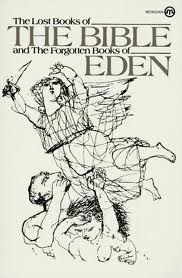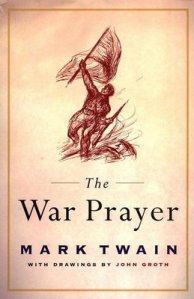 Through the past six years I’ve worked on and off at a local Christian bookstore. While the experience is rare you still can find something on the shelves from time to time that is actually worth reading. Not long ago I purchased one such product-a chunky white paperback with a pencil drawing on the front of it bearing the title The Lost Books of the Bible & the Forgotten Books of Eden. Within its covers I found a collection of Apocryphal and Pseudepigraphical writings whose dates and places of composition can only be guessed at.
Through the past six years I’ve worked on and off at a local Christian bookstore. While the experience is rare you still can find something on the shelves from time to time that is actually worth reading. Not long ago I purchased one such product-a chunky white paperback with a pencil drawing on the front of it bearing the title The Lost Books of the Bible & the Forgotten Books of Eden. Within its covers I found a collection of Apocryphal and Pseudepigraphical writings whose dates and places of composition can only be guessed at.
Some of the stuff I’ve read in this book so far is downright silly. Other parts, however, are nothing short of intriguing, even beautiful in both style and content. Of the latter, one of the titles I took immediate interest in was a two-part saga simply called Adam & Eve. Come to find out it is the story of Adam and Eve after their banishment from the Garden by God, starting from the day they leave Eden and ending with the assumption of Enoch into heaven before the Flood, a story I never even knew existed.
Sounds interesting? It did to me.
The book is far too long to go into much detail about here. While there is certainly some of the aforementioned silliness contained in its pages (for instance, at one point God delivers Adam from the devil’s attack by stirring a great wind and blowing the serpent, whose form the deceiver had again taken, far away onto the shores of distant India), there is still a very great deal worth taking note of.
The dialogue between Adam and Eve when they compare their new, fallen condition to the way their minds and bodies were in the garden is most intriguing, and the promises made to them by God that one day He Himself will come as their Savior are nothing short of profound. Once, upon Adam being overwhelmed with fear at the darkness of the cave he and Eve were living in, the story goes that God came to him and said,
All this misery that you have been made to take upon yourself because of your transgression will not free you from the hand of Satan, and it will not save you. But I will. When I shall come down from heaven, and shall become flesh of your seed, and take upon myself the infirmity from which you now suffer, then the darkness that came upon you in this cave shall come upon me in the grave, when I am in the flesh of your seed. And I, who am without years, shall be subject to the reckoning of years, of times, of months, and of days, and I shall be reckoned as one of the sons of men, in order to save you.
Part 1 of the story deals mainly with the interactions of Adam and Eve with God, each other, and the devil. Emphasis is laid upon man’s ignorance and repeated failure in the face of temptation, the devil’s craftiness in deceiving, and God’s repeated mercy towards His created couple. Some very interesting things are said about the nature of man, God, and Satan as well. It ends with the birth of their children and the murder of Abel at the hand of his brother Cain.
Part 2 takes up the story from there and proceeds all the way to the falling away of Seth’s righteous seed and the preservation of only three righteous men-Methuselah, Lamech, and Noah-who remained on the earth prior to the Flood. The ending forms a perfect setup for The Book of the Secrets of Enoch, which immediately follows the story of Adam and Eve in the collection of books.
Most readers will no doubt recognize many corresponding elements between the story of Adam and Eve and the more familiar account found in the book of Genesis. Nothing here contradicts that account from what I can tell, but what you will find is far more detail given about the people, places, and events with which most of us are already familiar. If you are at all interested in the stories of antiquity which form the link, as the editor puts it, between “the time when human life began, [and] the time when the human mind could express itself and the human hand could write,” you will want to check out this story of Adam and Eve for yourself. At the very least it forms an interesting supplement to the Genesis account, filling in many of the blanks left to us by scripture. So go grab a copy and let me know what you think.



